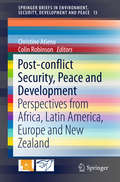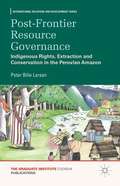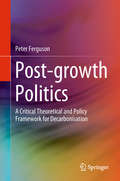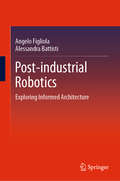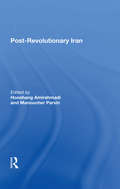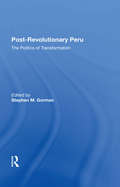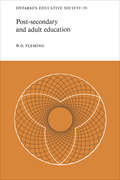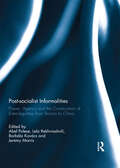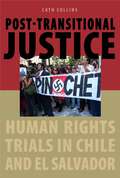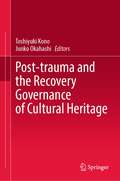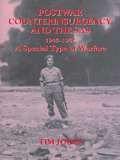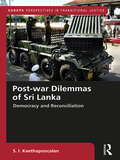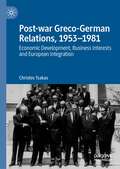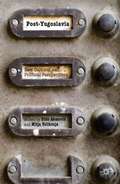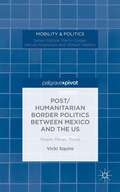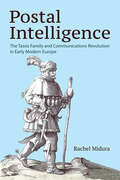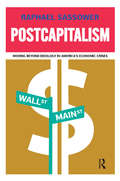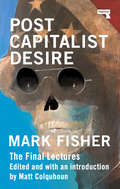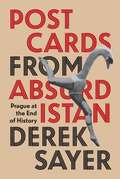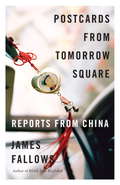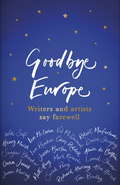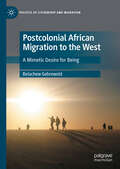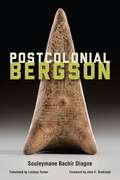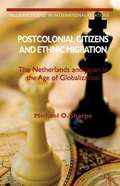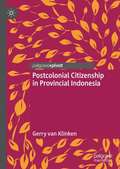- Table View
- List View
Post-conflict Security, Peace and Development: Perspectives From Africa, Latin America, Europe And New Zealand (Springerbriefs In Environment, Security, Development And Peace Ser. #13)
by Christine Atieno Colin RobinsonThis book examines links between post-conflict security, peace and development in Africa, Latin America, Europe and New Zealand. Young peace researchers from the Global South (Uganda, Ivory Coast, Kenya, Brazil, Colombia) as well as from Italy and New Zealand address in case studies traumas in Northern Uganda, demobilisation and reintegration of ex-combatants in the Ivory Coast, economic and financial management of terrorism in Kenya, organised crime in Brazil, mental health issues in Colombia, macro realism in Europe and global defence reforms within the military apparatus since 1990. The book reviews linkages between regional stability, development and peace in post-conflict societies while adding on to the post 2015 international agenda and discusses linkages between peace, security and development.
Post-frontier Resource Governance
by Peter Bille LarsenThe 20th century involved an unprecedented scramble for resources reaching the most remote corners of the world. Simultaneously, a quiet revolution has taken place with environmental protection, land and community rights regimes gradually taking hold, albeit unevenly, across the global South. Institutional topographies and policies have never before appeared as green and socially inclusive, yet co-exist with a deepening socio-environmental crisis. Intensified pressures stand in contrast to,persist, and even thrive under new environmental and social protection measures. The author offers an anthropological analysis of the paradox. Building on the concept of post-frontier governance, he presents a portrayal of the host of new regulatory technologies, practices and institutions that nominally close, yet more accurately characterize and restructure, contemporary resource frontiers. The book examines these arrangements ethnographically in the Peruvian Amazon by focusing on the Y#65533;nesha people and their involvement with the organization of indigenous rights, conservation and protected area planning, logging, and oil development.
Post-growth Politics: A Critical Theoretical and Policy Framework for Decarbonisation (Green Energy and Technology)
by Peter FergusonThis book uses a critical political economy approach to develop an historically and politically grounded set of strategies for states to move toward a post-growth, decarbonised global economy. It begins by examining the social and ecological costs of and limits to economic growth and determines that significant decarbonisation of the global economy can only be achieved if conventional growth-based economies are replaced by an alternative post-growth economy.Set apart from many other works in the field by its critical political economy approach to policy development, this book offers the reader three distinctive features. First, it places the analysis in historical context in order to demonstrate how the global political economy is constantly changing with respect to distributions of wealth, power and fundamental norms, and explores how states might harness and transform these contingent patterns in a post-growth direction. Second, the book is not only concerned with developing and advocating post-growth policies, but also with how these measures can be incorporated into the high-level domestic and international strategies pursued by states to ensure their political legitimacy and economic and geopolitical survival. Third, rather than proposing an idealised and politically naïve model of socioecological transformation, the proposed post-growth policy framework is highly cognisant of the geopolitical and international economic pressures facing states and demonstrates how these can be managed in the transition toward a post-growth economy.This book represents an invaluable resource for policymakers, academics, activists and students wishing to study or contribute to the transition to a post-growth, decarbonised economy.
Post-industrial Robotics: Exploring Informed Architecture (Springerbriefs In Architectural Design And Technology Ser.)
by Angelo Figliola Alessandra BattistiThis book highlights the concept of informed architecture as an alternative to performance-based approaches. Starting with an analysis of the state of art, the book defines an operative methodology in which performative parameters lead to the generation of the shape becoming the design’s input, rather than being mere quantitative parameters. It then uses case studies to investigate the methodology. Lastly, the book discusses a novel way of conceiving and using the manufacturing tool, which is the basis for the definition of informed architectures in relation to data usage and the optimization process.
Post-revolutionary Iran
by Manoucher Parvin Hooshang AmirahmadiOriginally published in 1998. More than half of the chapters were originally presented at the 1985 conference of the Center for Iranian Research and Analysis (CIRA) held at Rutgers, The State University of New Jersey, as well as additional content. The primary purpose of this book is to analyze transformations in the ideological, political, and soc
Post-revolutionary Peru: The Politics Of Transformation
by Stephen M. GormanWhether the nearly twelve years of military rule in Peru--between October 1968 and July 1980--are labelled a revolution, œso-called revolution, or simply a ‘military dictatorship’, one fact remains inescapable: the reforms and programs of the armed forces during that period profoundly altered Peruvian society. This book examines the social, political, and economic legacies of the military government and identifies major areas of tension that are likely to pose problems for the new civilian government. Following a review of the ideology, socio-economic goals, and political performance of the Institutional Revolution of the Armed Forces, the authors analyze the contemporary political economy of Peru and catalog the political and economic policy alternatives available to the Belaúnde regime in the next few years. They discuss the return to partisan politics in Peru, urban and rural conditions, and the way in which real political power has remained with the military forces, despite their surrender of formal authority. Subsequent chapters outline the IMF-imposed stabilization program, revealing its devastating effects on Lima's urban poor, and summarize recent Peruvian foreign policy. A final chapter draws on the prior discussion to present a critical analysis of the transitionary process from military to civilian rule in Peru.
Post-secondary and Adult Education: Ontario's Educative Society, Volume IV
by W. G. FlemingPost-secondary education is one of the fastest growing segments of the educational system. In this volume the development and activities of universities, colleges of applied arts and technology, and other institutions of post-secondary education are described in detail. The public and private training activities of business and industry are outlined, and government programs for adult retraining described. Dr Fleming traces the origins of the institutes of technology and the college of applied art and technology, and he provides capsule histories of every university in Ontario.
Post-socialist Informalities: Power, Agency and the Construction of Extra-legalities from Bosnia to China
by Abel Polese, Lela Rekhviashvili, Borbála Kovács and Jeremy MorrisThis book is a comprehensive collection of key scholarship on informality from the whole post-socialist region. From Bosnia to Central Asia, passing through Russia and Azerbaijan, the contributions to this volume illustrate the multi-faceted and complex nature of informality, while demonstrating the growing scholarly and policy debates that have developed around the understanding of informality. In contrast to approaches which tend to classify informality as ‘bad’ or ‘transitional’ – meaning that modernity will make it disappear – this edited volume concentrates on dynamics and mechanisms to understand and explain informality, while also debating its relationship with the market and society. The authors seek to explain informality beyond a mere monetaristic/economistic approach, rediscovering its interconnection with social phenomena to propose a more holistic interpretation of the meaning of informality and its influence in various spheres of life.They do this by exploring the evolving role of informal practices in the post-socialist region, and by focusing on informality as a social organisation determinant but also looking at the way it reshapes emergent social resistance against symbolic and real political order(s). This book was originally published as two special issues, of Caucasus Survey and the Journal of Contemporary Central and Eastern Europe.
Post-transitional Justice: Human Rights Trials in Chile and El Salvador
by Cath CollinsLatin America is still dealing with the legacy of terror and torture from its authoritarian past. In the years after the restoration of democratic governments in countries where violations of human rights were most rampant, the efforts to hold former government officials accountable were mainly conducted at the level of the state, through publicly appointed truth commissions and other such devices. This stage of “transitional justice” has been carefully and exhaustively studied. But as this first wave of efforts died down, with many still left unsatisfied that justice had been rendered, a new approach began to take over. In Post-transitional Justice, Cath Collins examines the distinctive nature of this approach, which combines evolving legal strategies by private actors with changes in domestic judicial systems. Collins presents both a theoretical framework and a finely detailed investigation of how this has played out in two countries, Chile and El Salvador. Drawing on more than three hundred interviews, Collins analyzes the reasons why the process achieved relative success in Chile but did not in El Salvador.
Post-trauma and the Recovery Governance of Cultural Heritage
by Toshiyuki Kono Junko OkahashiThis book successfully represents the indispensable interdisciplinarity of viewpoints by its authors combining legal perspectives with architectural and anthropological approaches. With the observation and analysis presented here, this book is the first to demonstrate research-based governance solutions for cultural heritage within the process of recovering from traumatic events. Its opening statement is that universal international standards are not effective enough for the specific situations of disaster-struck places.A major objective of this monograph is to allow its readers to go through a learning experience, from plural cases where reconstruction of cultural heritage became central to rebuilding a post-disaster society. This book introduces Japan as the most disaster-prone country, with a long history of confronting and overcoming the power of nature, resulting in its unique solutions for cultural heritage resilience and sustainability. But how do leadership and decision making become efficient in times of recovery? Bearing in mind what may be lacking in Japanese practices, this work also presents comparable governance models from other countries which indicate alternative solutions.While a traumatic event may occur within one night, the process of recovery could last for decades. Such disasters also tend to recur. In order that directly affected communities can sustain resilience throughout the long recovery period, and that equally severe social trauma will not be repeated, a continuous, well-maintained governance response is required, whether grounded in local knowledge or national policy frameworks. At the heart of this book is the matter of the reconstruction process involving networks of small and large communities. Each of those has a role that becomes operational through linkages of contacts, the interchange of knowledge and skills, and above all through the sharing of common goals.
Post-war Counterinsurgency and the SAS, 1945-1952: A Special Type of Warfare (Military History and Policy)
by Tim JonesThis work details the state of British counterinsurgency knowledge by 1945, and shows how wartime special forces and unconventional warfare affected many postwar counterinsurgencies. The vital role of the Special Air Service (SAS) is revealed here for the first time.
Post-war Dilemmas of Sri Lanka: Democracy and Reconciliation (Europa Perspectives in Transitional Justice)
by S. I. KeethaponcalanBy investigating Sri Lanka as a case study, this book examines whether democracy, compared to authoritarianism, is conducive to post-war reconciliation. The research, founded on primary as well as secondary data, concludes that political systems have little to do with the success or failure of post-war ethnic reconciliation. The Sri Lankan case indicated that post-war reconciliation is more contingent on the readiness of the former enemies to come together. Readiness stems from, for example, satisfaction in the way issues have been resolved, confidence in the other party's intentions, and the compulsion to coexist. If the level of satisfaction, confidence, and the compulsion to coexist are low, the readiness to reconcile will also be low. The end of the war had a profound impact on post-war governance and ethnic relations in Sri Lanka. Hence, the volume provides an in-depth analysis of the factors that led to the military victory of the Sri Lankan government over the Liberation Tigers of Tamil Eelam (LTTE) in 2009. The chapters delve into the nexus between governance and reconciliation under the first two post-war governments. Reconciliation did not materialize in this period. Instead, new fault-lines emerged as attacks on the Muslim community escalated drastically. This book provides a comprehensive analysis of the nature of relations between the Sinhalese and Muslims and the Tamils and Muslims, as well as the nature and causes of post-war anti-Muslim riots.
Post-war Greco-German Relations, 1953–1981: Economic Development, Business Interests and European Integration
by Christos TsakasThis book explores the post-war Greco-German relationship and asks how this relationship fits into, and changes, the narrative of European integration. The book highlights West Germany’s role in shaping Greece’s development model and argues that Greece's accession to the Community in 1981 had a long back story in the modernization strategies adopted by the two countries as early as the 1950s. The success, not the failure, of those strategies lies at the root of Greece's lingering balance of payments problems: the ever-widening trade deficit with Germany, the country’s main trading partner, was the price of Greek economic growth in the decades following the war. By addressing this three-decade story of uneasy continuity, the book offers new insights into core-periphery relations in Europe, questions the conventional wisdom about Greece’s path to Europe, and challenges the way the so-called North-South divide has been adduced to explain the recent euro crisis. In doing so, the author calls attention to past cooperation between leading political and business circles in Greece and Germany, making this a useful and insightful read for historians and political scientists alike.
Post-yugoslavia
by Dino Abazović Mitja VelikonjaThis interdisciplinary examination of present-day identities and histories of the former Yugoslavia explores relationships with the social, political, cultural and historical 'facts and fictions' that have marked the different parts of the region. It shows that while nationalism remains important other social dynamics also exert a strong influence.
Post/Humanitarian Border Politics between Mexico and the US: People, Places, Things
by Vicki SquireWhat is the significance of the things that migrants leave behind in contemporary border struggles? In what ways do places like the desert play a role in such struggles? And what is the status of people in this context? The author addresses these questions by assessing the politics of different humanitarian interventions in the Mexico-US border region. Examining various artistic and academic engagements of things left behind, as well as legal struggles over the distribution of water bottles and practices of recycling of discarded belongings, this book develops a unique 'more-than-human' perspective on the significance of people, places and things to humanitarian border struggles. While drawing attention to the ambiguities of humanitarian interventions, Squire also focuses on the critical potential of a post/humanitarian border politics that transforms place by fighting for people, through things.
Postal Intelligence: The Tassis Family and Communications Revolution in Early Modern Europe
by Rachel MiduraPostal Intelligence connects and situates histories of the post and government intelligence alongside print technology and state power in the wider context of the early modern communications revolution. In the sixteenth century, postal services became central to domestic governance and foreign policy enterprises, extended government reach and surveillance, and offered new control over the public sphere.Rachel Midura focuses on the Tassis family, members of which served as official postmasters to the dukes of Milan, the pope, Spanish kings, and Holy Roman emperors. Using administrative records and family correspondence, she follows the Tassis family, their agents, and their rivals as their influence expanded from northern Italy across Europe. Postal Intelligence shows how postmasters and postmistresses were key players in early modern diplomacy, commerce, and journalism, whose ultimate success depended on both administrative ingenuity and strategic ambiguity.
Postcapitalism: Moving Beyond Ideology in America's Economic Crisis
by Raphael SassowerDebates over the role of government have intensified in the wake of America's deepest financial crisis since the Depression. This book suggests new ways of moving forward based on the policies and principles that have worked in the past. Sassower shows how American pragmatism has guided the more successful financial policies undertaken during the past century. This means that from the workplace to foreign aid, Americans benefit when they collaborate with each other rather than only pursue their self-interest in competitive ways. Drawing on thinkers from Adam Smith to Keynes to Bernanke, Sassower shows how a new era of postideological capitalism can emerge in the wake of the current economic crisis-renewing America's leadership for the future.
Postcapitalist Desire: The Final Lectures
by Mark FisherA collection of transcripts from Mark Fisher's final series of lectures at Goldsmiths, University of London, in late 2016.Edited with an introduction by Matt Colquhoun, this collection of lecture notes and transcriptions reveals acclaimed writer and blogger Mark Fisher in his element -- the classroom -- outlining a project that Fisher's death left so bittersweetly unfinished.Beginning with that most fundamental of questions -- "Do we really want what we say we want?" -- Fisher explores the relationship between desire and capitalism, and wonders what new forms of desire we might still excavate from the past, present, and future. From the emergence and failure of the counterculture in the 1970s to the continued development of his left-accelerationist line of thinking, this volume charts a tragically interrupted course for thinking about the raising of a new kind of consciousness, and the cultural and political implications of doing so.For Fisher, this process of consciousness raising was always, fundamentally, psychedelic -- just not in the way that we might think...
Postcards from Absurdistan: Prague at the End of History
by Derek SayerA sweeping history of a twentieth-century Prague torn between fascism, communism, and democracy—with lessons for a world again threatened by dictatorshipPostcards from Absurdistan is a cultural and political history of Prague from 1938, when the Nazis destroyed Czechoslovakia’s artistically vibrant liberal democracy, to 1989, when the country’s socialist regime collapsed after more than four decades of communist dictatorship. Derek Sayer shows that Prague’s twentieth century, far from being a story of inexorable progress toward some “end of history,” whether fascist, communist, or democratic, was a tragicomedy of recurring nightmares played out in a land Czech dissidents dubbed Absurdistan. Situated in the eye of the storms that shaped the modern world, Prague holds up an unsettling mirror to the absurdities and dangers of our own times.In a brilliant narrative, Sayer weaves a vivid montage of the lives of individual Praguers—poets and politicians, architects and athletes, journalists and filmmakers, artists, musicians, and comedians—caught up in the crosscurrents of the turbulent half century following the Nazi invasion. This is the territory of the ideologist, the collaborator, the informer, the apparatchik, the dissident, the outsider, the torturer, and the refugee—not to mention the innocent bystander who is always looking the other way and Václav Havel’s greengrocer whose knowing complicity allows the show to go on. Over and over, Prague exposes modernity’s dreamworlds of progress as confections of kitsch.In a time when democracy is once again under global assault, Postcards from Absurdistan is an unforgettable portrait of a city that illuminates the predicaments of the modern world.
Postcards from Tomorrow Square: Reports from China
by James Fallows“Americans need not be hostile toward China's rise, but they should be wary about its eventual effects. The United States is the only nation with the scale and power to try to set the terms of its interaction with China rather than just succumb. So starting now, Americans need to consider the economic, environmental, political, and social goals they care about defending as Chinese influence grows. ” —from “China Makes, the World Takes” Since December 2006,The Atlantic Magazine's James Fallows has been writing some of the most discerning accounts of the economic and political transformation occurring in China. The ten essays collected here cover a wide-range of topics: from visionary tycoons and TV-battling entrepreneurs, to environmental pollution and how China subsidizes our economy. Fallows expertly and lucidly explains the economic, political, social, and cultural forces at work turning China into a world superpower at breakneck speed. This eye-opening and cautionary account is essential reading for all concerned not only with China's but America's future role in the world. From the Trade Paperback edition.
Postcards to Europe: The unique must-have collection
by VariousThis is not a book about politics. It is a book about what makes us British, and what makes us European.Spend time with some of your favourite writers and artists in this truly unique collection spanning everything from art, language, food, music and movies, to war, literature, driving, nudity, geography, smoking and nature.Featuring pieces of exceptional quality from some of our most treasured novelists, historians, journalists, poets and artists, including: Jessie Burton, Richard Herring, Alain de Botton, Tom Bradby, Val McDermid, Matt Haig, Afua Hirsch, Lionel Shriver, Sarah Perry, Sanjeev Bhaskar, Ian Rankin, Owen Jones, Mark Kermode, Robert Macfarlane, Chris Riddell, Former Prime Minister Jim Hacker and many more.A must-read for anyone who wants to understand the times we live in, our relationship with the continent, and ourselves.* * * * *INCLUDES PIECES BY:Yasmin Alibhai-Brown, Sanjeev Bhaskar, Tom Bradby, Jessie Burton, Ben Collins (aka The Stig), Colonel Tim Collins, Robert Crampton, Adam Dant, Alain de Botton, Kate Eberlen, Matt Frei, Nicci French, Simon Garfield, Jonathan Lynn writing as Former Prime Minister Jim Hacker, Matt Haig, Richard Herring, Jennifer Higgie, Afua Hirsch, Owen Jones, Oliver Kamm, Alex Kapranos, Mark Kermode, Hari Kunzru, Olivia Laing, Marie Le Conte, Amy Liptrot, Robert Macfarlane, Henry Marsh, Val McDermid, Ian McEwan, Hollie McNish, Kate Mosse, Jenni Murray, Sarah Perry, Ian Rankin, Jacob Rees-Mogg, Cathy Rentzenbrink, Chris Riddell, Andrew Roberts, Will Self, David Shrigley, Lionel Shriver, Sunny Singh, Ece Temelkuran, Rob Temple, Bee Wilson, Sarah Winman
Postcolonial African Migration to the West: A Mimetic Desire for Being (Politics of Citizenship and Migration)
by Belachew GebrewoldPostcolonial African migration to the West is not only a spatial movement in search of material and physical security but also an expression of the mimetic desire for being by imitating the West or “whitening” oneself against the background of the dehumanizing historical legacies of slavery, colonialism, and Western dominance. It is a flight from oneself, from perceived inadequacies. To migrate to the West is an expression of the desire for being, not through detachment from the “fascinating” West but rather through adoration and imitation of its lifestyle, beauty ideals, and soft and hard power, and by living in the West. The model (the West) builds ubiquitous anti-migrant physical and virtual fences, which the imitator tries to overcome. The more the model re-strengthens these fences, the more the imitator tries to scale them. The anti-migrant fences are the meeting point of the model’s perceived superiority, admirability, and desirability on the one hand, and on the other hand the imitator’s inferiority complex and inner tension between the paradoxical desire for detachment from the model and its passionate imitation at the same time. This book argues that African migration to the West will continue even in the absence of poverty, conflicts, and climate change because it is also about the mimetic desire for being.
Postcolonial Bergson
by Souleymane Bachir DiagneHenri Bergson has been the subject of keen interest within French philosophy ever since being championed by Gilles Deleuze and others. Yet his influence extends well beyond European philosophy, especially within Africa and South Asia. Postcolonial Bergson traces the influence of Bergson’s thought through the work of two major figures in the postcolonial struggle, Muhammad Iqbal and Léopold Sédar Senghor. Poets and statesmen as well as philosophers, both of these thinkers—the one Muslim and the other Catholic—played an essential political and intellectual role in the independence of their respective countries. Both found, in Bergson’s work, important support for their philosophical, cultural, and political projects.For Iqbal, a founding father of independent Pakistan, Bergson’s conceptions of time and creative evolution resonated with the need for the “reconstruction of religious thought in Islam,” a religious thought newly able to incorporate innovation and change. For Senghor, Bergsonian ideas of perception, intuition, and élan vital—filtered in part through the work of the French philosopher Pierre Teilhard de Chardin—proved crucial for thinking about African art, as well as foundational for his formulations of African socialism and his visions of an unalienated African future.At a moment of renewed interest in Bergson’s philosophy, this book, by a major figure in both French and African philosophy, gives an expanded idea of the political ramifications of Bergson’s thought in a postcolonial context.
Postcolonial Citizens and Ethnic Migration
by Michael O. SharpeThis book provides a cross-regional investigation of the role of citizenship and ethnicity in migration, political incorporation, and political transnationalism in the age of globalization, exploring the political realities of Dutch Antilleans in the Netherlands and Latin American Nikkeijin in Japan.
Postcolonial Citizenship in Provincial Indonesia
by Gerry van KlinkenThis book examines the history of state formation in postcolonial Indonesia by starting with the death of Jan Djong, an activist and a former village head in the little town of Maumere. It historicizes contemporary debates on citizenship in the postcolonial world.Citizenship has been called the “organizing principle of state-society relations in modern states”. Democratization is today most intense in the non-Western, post-colonial world. Yet “real” citizenship seems largely absent there. Only a few rights-claiming, autonomous, and individualistic citizens celebrated in mainstream literature exist in post-colonial countries.In reflecting on one concrete story to examine the core dilemmas facing the study of citizenship in postcolonial settings, this book challenges ethnocentricity found within current scholarly work on citizenship in Europe and North America and addresses issues of institutional fragility, political violence, as well as legitimacy and aspirations to freedom in non-Western cultures.
